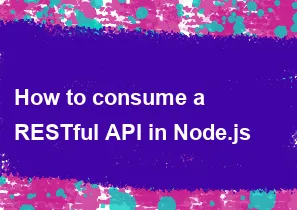How to consume a RESTful API in Node.js

To consume a RESTful API in Node.js, you can use the built-in http module or use popular third-party libraries like axios or node-fetch. In this example, I'll demonstrate using axios, as it provides a simple and clean API for making HTTP requests.
First, install axios using npm (Node Package Manager) if you haven't already:
bashnpm install axios
Now, you can use the following code to consume a RESTful API in Node.js:
javascriptconst axios = require('axios');
// Define the API endpoint
const apiUrl = 'https://api.example.com/data';
// Make a GET request
axios.get(apiUrl)
.then(response => {
// Handle the API response data
console.log('API Response:', response.data);
})
.catch(error => {
// Handle errors
console.error('Error:', error.message);
});
This is a basic example using a GET request. Depending on the API you're working with, you may need to use other HTTP methods like POST, PUT, or DELETE. Here's an example of a POST request:
javascriptconst axios = require('axios');
const apiUrl = 'https://api.example.com/data';
// Data to be sent in the POST request
const postData = {
key1: 'value1',
key2: 'value2'
};
// Make a POST request
axios.post(apiUrl, postData)
.then(response => {
console.log('API Response:', response.data);
})
.catch(error => {
console.error('Error:', error.message);
});
Make sure to check the API documentation for the specific endpoint you are working with to understand the required HTTP methods and request payloads.
Remember to handle errors appropriately, as shown in the examples above, to ensure your application responds gracefully to issues like network problems or server errors.
-
Popular Post
- How to optimize for Google's About This Result feature for local businesses
- How to implement multi-language support in an Express.js application
- How to handle and optimize for changes in mobile search behavior
- How to handle CORS in a Node.js application
- How to use Vue.js with a UI framework (e.g., Vuetify, Element UI)
- How to configure Laravel Telescope for monitoring and profiling API requests
- How to create a command-line tool using the Commander.js library in Node.js
- How to implement code splitting in a React.js application
- How to use the AWS SDK for Node.js to interact with various AWS services
- How to use the Node.js Stream API for efficient data processing
- How to implement a cookie parser middleware in Node.js
- How to implement WebSockets for real-time communication in React
-
Latest Post
- How to implement a dynamic form with dynamic field styling based on user input in Next.js
- How to create a custom hook for handling user interactions with the browser's device motion in Next.js
- How to create a custom hook for handling user interactions with the browser's battery status in Next.js
- How to implement a dynamic form with dynamic field visibility based on user input in Next.js
- How to implement a dynamic form with real-time collaboration features in Next.js
- How to create a custom hook for handling user interactions with the browser's media devices in Next.js
- How to use the useSWRInfinite hook for paginating data with a custom loading indicator in Next.js
- How to create a custom hook for handling user interactions with the browser's network status in Next.js
- How to create a custom hook for handling user interactions with the browser's location in Next.js
- How to implement a dynamic form with multi-language support in Next.js
- How to create a custom hook for handling user interactions with the browser's ambient light sensor in Next.js
- How to use the useHover hook for creating interactive image zoom effects in Next.js